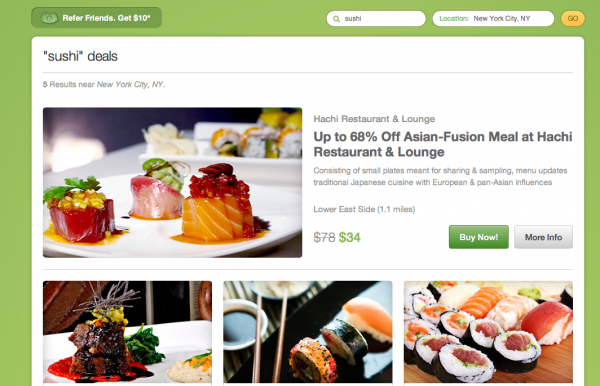Groupon Makes Bid To Become Local (Deals) Search Engine
Late last week Groupon announced that it was going to make a growing inventory of less perishable deals accessible to consumers. Calling this the Groupon “Local Marketplace” the new functionality is live in Chicago and New York, soon to be available across Groupon cities: In the last year, we’ve increased our North American selection of […]
![]() Late last week Groupon announced that it was going to make a growing inventory of less perishable deals accessible to consumers. Calling this the Groupon “Local Marketplace” the new functionality is live in Chicago and New York, soon to be available across Groupon cities:
Late last week Groupon announced that it was going to make a growing inventory of less perishable deals accessible to consumers. Calling this the Groupon “Local Marketplace” the new functionality is live in Chicago and New York, soon to be available across Groupon cities:
In the last year, we’ve increased our North American selection of active deals by nearly 13 times, to more than 27,000 at the end of Q3. As of today, we’ve opened the doors so you can search and browse that inventory of deals, both daily deals and real-time Now! deals. Yes, you can actually type in a search (“pizza,” “couple’s massage,” “oil change”), and you can browse by category (Food & Drink, Beauty & Spa, and so on) and subcategory (Indian Cuisine, Massage, Yoga). You can also specify exactly where you want your deals. Just type in an address, a neighborhood, or a city, and we’ll instantly find the closest, most relevant deals for that location.

This is part of Groupon’s larger product diversification plan away from push email marketing. In another way of looking at it Groupon is making a bid to become a local deals search engine, a destination where consumers go to look for local offers and deals.
One of the criticisms of the daily deals market — and one reason why it has fallen from its peak last year — is that many push email deals are simply not relevant to users. In-boxes were (and still are) clogged with irrelevant offers. Adopting a search or directional media model helps address that problem, at least in theory.
In the old way of interacting with Groupon, consumers would simply sign up for the daily email and rarely visit the Groupon site, though some use the Groupon mobile app. In the new model Groupon wants you to visit the site on a regular basis looking for discounts on business categories where you have an already existing need: the search model.
In this way Groupon hopes it will generate more engagement, usage frequency and utility for both consumers and advertisers. People who want car detailing or botox treatments are more likely to buy such deals than those who aren’t already interested.
The challenge with a search model, however, is that Groupon will need to have much more deals inventory to make it all work. If users search and get limited or poor quality results they’re unlikely to continue using a Groupon deals search engine. This has always been Valpak’s problem as an online destination: not enough coupon inventory.
If Groupon can build up a reasonable selection of offers that have a persistent shelf life the company can make a reasonable run at this notion of a local deals marketplace.
Groupon is under intensifying pressure to convince investors that its business can survive over the long term. Euphoria has given way to skepticism and even dismissal, as the stock has lost about 90 percent of its value since the company’s IPO last fall.
Contributing authors are invited to create content for Search Engine Land and are chosen for their expertise and contribution to the search community. Our contributors work under the oversight of the editorial staff and contributions are checked for quality and relevance to our readers. The opinions they express are their own.
Related stories
New on Search Engine Land